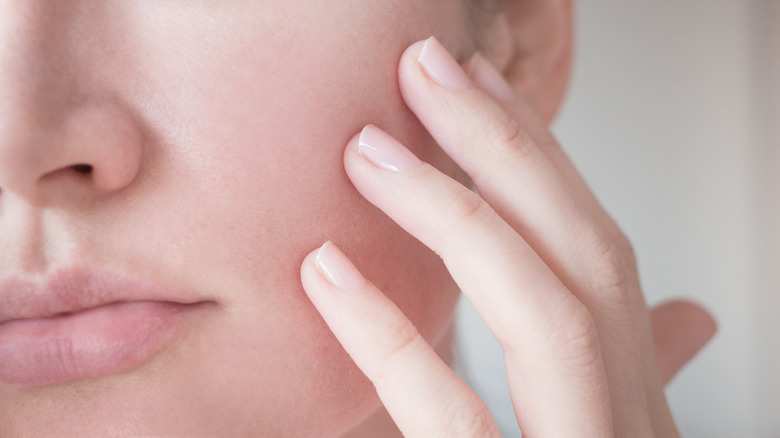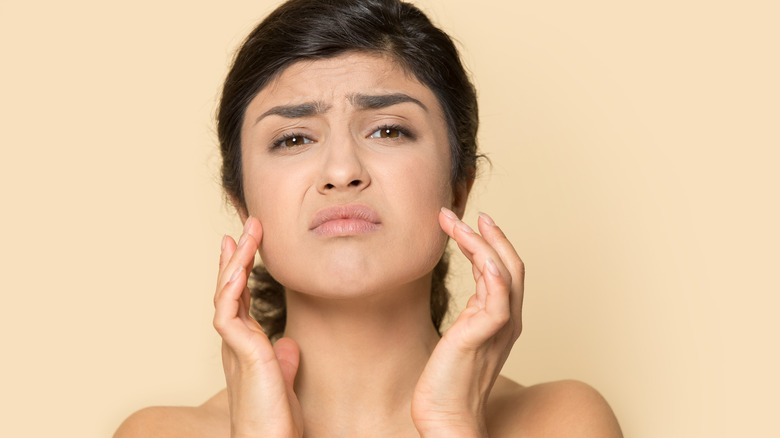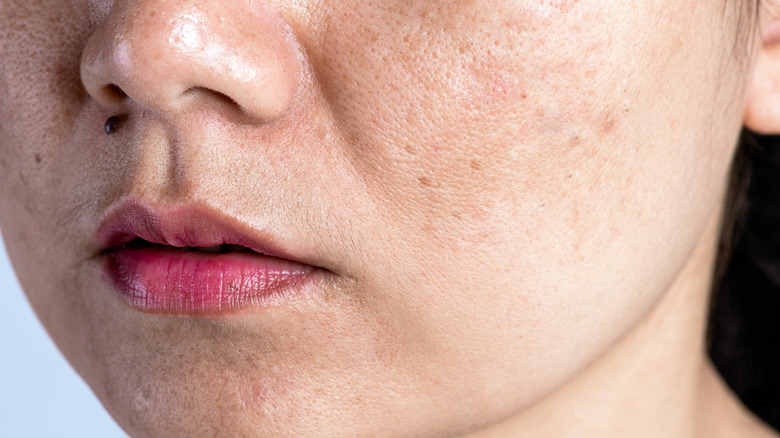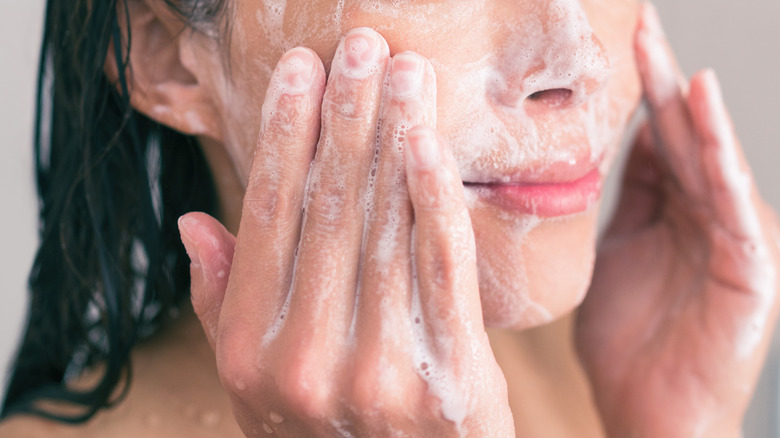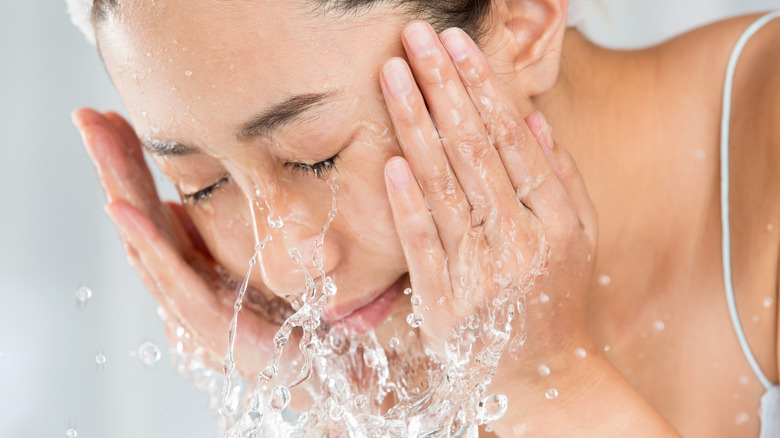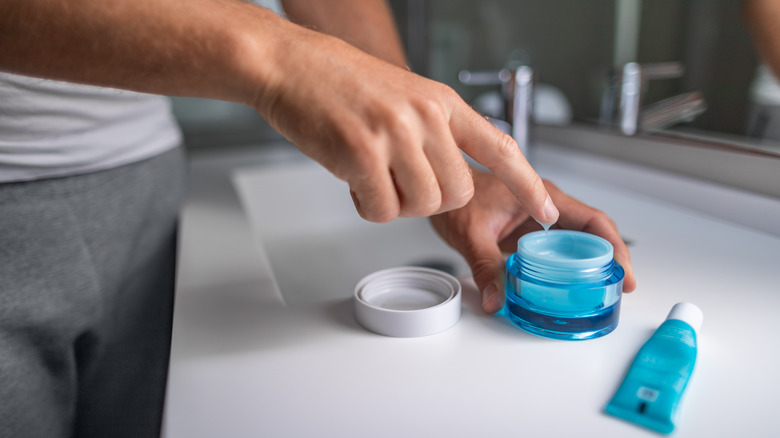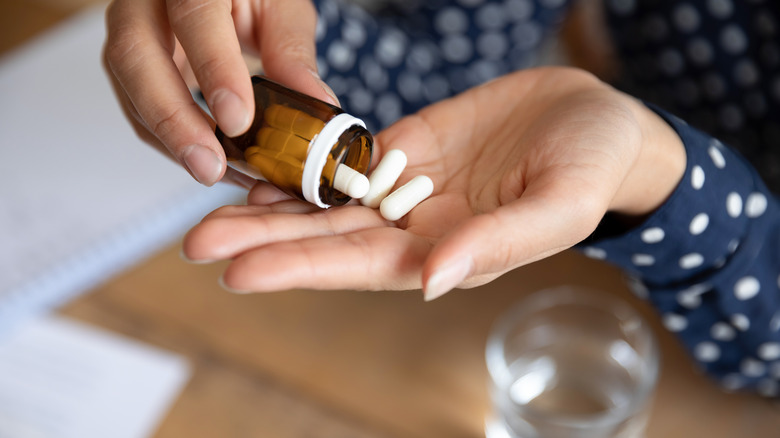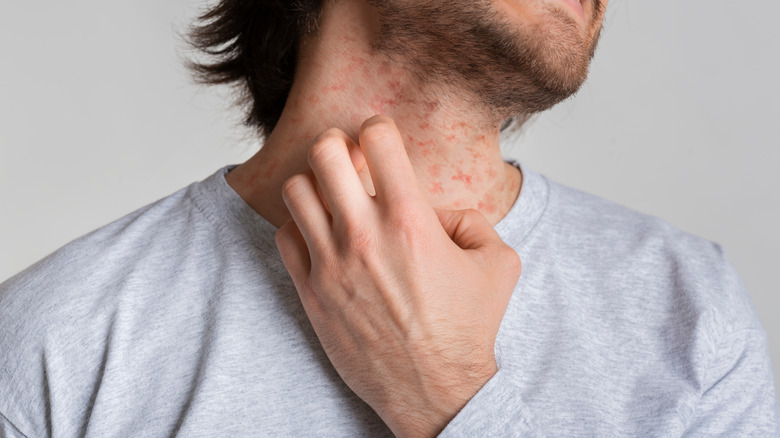Surprising Causes Of Dry Skin You Never Expected
Our skin is a major interface between us and the world, and is often seen as a window into our health. As we journey through life, the body's largest organ undergoes various insults from the environment, the things we consume, and the roller coaster of emotions we experience on a daily basis.
Dry skin, also known as "xerosis" can range from coarseness to mild scaling and flaking, as well as manifesting as chronic skin diseases like psoriasis and eczema, according to the American Skin Association. The human body sheds around 30,000 to 40,000 skin cells per day, replacing old ones with new ones (via WebMD). The skin is said to have three distinct layers, with its outermost barrier (known as the stratum corneum) being made up of a combination of dead skin cells and natural oils that help it retain its moisture. When this layer is compromised, the skin can quickly dry up and become flaky, leading to xerosis, per Harvard Health.
Dry skin can be both a nuisance and a nudge that something's not quite right. There are a wide spectrum of reasons why your skin might be gasping for hydration including genetics, lack of nutrients, or environmental factors like the weather (via Medical News Today). What's more, the dryness might be telling you to make a change you never would've expected. Here are some surprising factors that may be contributing to your dry skin issues.
You might have a hormonal imbalance
Your skin undergoes all sorts of changes under the influence of fluctuating hormones, reports Everyday Health. Our hormone levels often go overlooked until there's something a bit off. "Hormones play a key role in skin health. We know this because certain hormonal disorders manifest themselves in the skin and hair, in addition to internally," S. Tyler Hollmig, director of dermatologic surgery at UT Dell Medical School and Ascension Seton, told Everyday Health.
A common side effect of low levels of thyroid hormones, called hypothyroidism, is dry skin (via Mayo Clinic). Thyroid hormones stimulate the oil glands (called the sebaceous glands), which produce a natural oil called sebum to hydrate and protect the skin, according to research published in the U.S. National Library of Medicine. When thyroid levels drop, the skin doesn't produce a sufficient supply of sebum, causing it to become coarse and scaly.
Another hormone that can throw your skin out of whack is estrogen, which plays a key role in sexual development during a woman's life, including puberty, pregnancy, and menopause, per Everyday Health. Estrogen enables the skin to stimulate the right amount of sebum in order to keep it healthy and supple, but as a woman gets older, her estrogen levels start to fall, which leads to dryness and itchiness of the skin.
Hormone imbalances can arise from a number of factors, notes Everyday Health. "You can improve your skin health by getting plenty of sleep, having a balanced diet, exercising regularly, reducing alcohol consumption, and avoiding smoking," Hollmig advises.
You're feeling stressed out
While the detrimental effect of stress on our health is well-known, few people fully understand the impact it can have on our skin. When you're feeling stressed out, your cortisol levels — the body's stress hormone — shoot up and bring about an inflammatory response, common symptoms of which are dryness, dullness, redness, and increased sensitivity, according to Vogue.
An increase in cortisol sends the sebaceous glands into overdrive. The overproduction of oil can be particularly troublesome for those who are predisposed to certain skin conditions like psoriasis, rosacea and eczema, which explains why people tend to experience "flare-ups" when faced with stressful situations, the magazine reported. "Stress also causes what is referred to as neurogenic inflammation that causes itching, flushing and swelling," consultant dermatologist Justine Hextall told the publication. "Often, patients tell me the minute they get stressed in a meeting their skin becomes itchy and irritated, so they start to itch. The so-called itch-scratch cycle can be difficult to break."
A 2014 review published in Inflammation & Allergy Drug Targets showed that stress affects the functioning of your stratum corneum, which can negatively affect its water retention and lead to parched, itchy skin. According to the study, some researchers have also found that the stress caused by interviews and "marital disruption" can delay the skin barrier's ability to recover and heal itself.
Indoor heating is the culprit
There's nothing quite as romantic as snuggling up in front of a crackling fire during winter. Though, unfortunately, that dry indoor air can have a pretty harsh effect on your skin, leaving it dry and stressed, according to Refinery29,. A major contributing factor is your indoor heating system. "The heating systems we use are mostly dry air that sucks the moisture out," dermatologist Howard Sobel told the publication, adding that: "The old-time, water-heating systems were much less drying." There's also the impact of moving back and forth from inside to out, as some people's skin is particularly sensitive to changes in temperature (via WebMD).
When it comes to coping with dry indoor air, Sobel recommends investing in a humidifier which can counter the lack of moisture and add it back into the atmosphere. Alternatively, he suggests that you: "Put a pot of water on, and it will release moisture into the air as you heat the room." Another tip Howard gives is to use blankets instead and to use a timer to switch off or turn down your heater when you're sleeping.
Indoor heaters also spit out dust particles, pollen, and other allergens into the air, which not only have a deleterious impact on the condition of the skin but can inflame your sinuses and trigger respiratory problems like asthma or hayfever, per WebMD.
You're spending too much time outside during winter
Just as dry air leeches moisture out of the skin, the cold, biting air of the outdoors during winter can sap the skin of its natural oils. A study of German hairdressers published in the British Journal of Dermatology found that clients' complaints about dry skin increased significantly during the winter months.
Wintertime can result in roughness, flaking, cracking, and sometimes even a burning sensation, known as winter itch or "winter xerosis," according to Harvard Health. One explanation for this is that the low humidity of the air — both outdoors and indoors — causes the outer layer of your skin to hold less water. This layer also contains lipids and protein that keep the skin's cells packed with moisture, acting as a protective barrier for the layer of skin underneath it. When the outer barrier isn't functioning properly due to a change in weather, you may see a surge of itchiness and dryness (via Healthline).
A 2016 review article in the Journal of the European Academy of Dermatology and Venereology on climatic factors found that low temperatures and low humidity impair the skin's barrier function, namely its ability to shield and protect itself from external irritants, increasing the risk of dermatitis, a term that describes itchy, dry, and inflamed skin (via Mayo Clinic).
You're eating too much salt
It's common knowledge that what we eat can have a notable impact on the health and condition of our skin. But, you may not be aware that an excess of salt in our diet poses a particular problem, leading to severe dehydration. "Excess salt in the body draws more fluid out of the cells to help neutralize the salt and draw it out of the body," dietician Beth Warren told Bustle. "As a result, your skin gets drier because of the lack of fluid."
Research demonstrates that salt can exacerbate the symptoms of eczema, which is characterized by patches of inflammation, itchiness, swelling, and cracked skin (via Medical News Today). A 2019 study in Science Translational Medicine revealed that consuming too much salt, known scientifically as "sodium chloride," aggravates the body's T-helper cells, which — as the name suggests — help other cells of the immune system and play an important role in protecting the body against infections. When these cells go haywire, the body becomes more vulnerable to allergy-based illnesses and inflammatory skin conditions such as eczema (via ScienceDaily). The researchers of the study discovered that salt accumulation was 30 times higher in the skin of people suffering from moderate to severe eczema compared to those without eczema.
You may have an overgrowth of gut bacteria
Many of our skin issues can be tied back to the health of the gut microbiome. Just as there's constant communication between the gut and brain, our gut and skin are also interconnected, often referred to as the gut-skin axis, according to a 2021 review study published in the U.S. National Library of Medicine.
Coarse and rough skin point towards an unhealthy gut, says a 2019 review study in the same publication. However, the exact mechanism behind this is still poorly understood. Current evidence appears to indicate that this is due to a mix of "neurologic and immunologic responses to environmental shifts," which leads to chronic systemic inflammation that can affect the skin.
The researchers of the 2021 review suggest that "intestinal dysbiosis" — when the bacteria falls out of balance due to poor diet and lifestyle choices — can cause 'leaky gut' syndrome, whereby toxins are able to pass through the intestines and into the bloodstream, aggravating the immune system. This orchestrates an inflammatory state, which is thought to underlie many skin conditions including psoriasis and eczema (via National Eczema Association). "Poor gut health tends to affect our immune system, and for those prone to atopic dermatitis and eczema, it can lead to flare-ups that cause more skin itching and even decrease [the] skin's immune response to secondary infections," naturopath doctor Saman Faramarzi explained to Bustle, adding that "Poor gut health has been shown to affect our skin's ability to retain hydration due to transepidermal water loss, resulting in dry, dehydrated skin."
Your skin microbiome is out of balance
It's not just the bacteria in your gut that affects your skin health, but the bacteria on the skin itself is said to play an equally pivotal role. Your skin houses billions of bacteria, referred to as the skin microbiome — sometimes the skin flora — says research in the Journal of the American Academy of Dermatology, protecting you against harmful pathogens.
A 2017 study in the World Allergy Organization Journal shows that a balanced and harmonious microbiome on the skin's surface helps sustain the skin's vitality. When this ecosystem of bacteria is disrupted, depending on its environment or the characteristics of the individual, its protective barrier is compromised, which can influence the way your skin looks and feels. Studies published in Science Magazine have shown that moist versus dry skin areas "are likely as ecologically dissimilar as rain forests are to deserts." For example, the skin microbiome of a postmenopausal woman is vastly different to that of a hormonal, teenage boy.
The lack of diversity of your skin flora can knock your skin's pH off balance, bringing on dry skin, acne, redness, an overproduction of sebum, and numerous other problems (via World Allergy Organization Journal). While there certainly appears to be a strong relationship between your skin's microbiome and dryness, further research is required to better understand the science behind this.
You're washing your face too often
Handwashing is an important part of our everyday routine to reduce and prevent the spread of viruses and diseases (via UCLA Health). But, when it comes to your face, it's certainly worth paying attention to the frequency and intensity of your daily scrubs.
The outermost layer of our skin is composed of natural oils and wax, which guards it from outside toxins and helps it retain its natural moisture, per UCLA Health. Overwashing and overcleansing any part of your skin can break down this natural barrier and make your it vulnerable to various issues as well as sending its pH balance off-kilter, details IntegrativeHealthcare.org. This can give rise to pain, redness, flaking and itching, says Sara Hogan, a dermatologist at UCLA Health Santa Monica Medical Center, via UCLA Health.
Susan T. Nedorost, a dermatologist and associate professor of dermatology at University Hospitals Case Medical Center, told IntegrativeHealthcare.org: "Healthcare workers who wash their hands repeatedly are at an increased risk of developing hand dermatitis, which can take months to heal."
You're washing your face with hard water
It's not just the regularity with which you wash your face, but the type of water you're splashing it with that can have an effect on your skin, warns the U.S. Geological Survey. The term "hard water" describes water that contains high amounts of naturally-occurring, dissolved calcium and magnesium ions. You may notice the buildup of these minerals by the stains on your drinking glasses. Your skin might also display the tell-tale signs of being afflicted by hard water.
Hard water can upset the skin's natural oil balance, thereby causing redness and dryness (via Refinery29). "The calcium settles on the skin and changes one's own oil chemistry, which compromises the skin's ability to moisturize itself. It also leads to large pores, acne, rashes, itching, and rosacea," dermatologist Dennis Gross reported via Refinery29.
Consultant dermatologist Anjali Mahto also told the publication: "Research has shown that hard water — water that passes through chalk and limestone rock and carbonates along the way — can damage the barrier of the skin and contribute to the risk of developing eczema, as well as increasing its sensitivity."
To combat the problematic effects of hard water, be sure to cleanse and moisturize your skin with brands that replace the water content in their products with mineral water, advises Refinery29. Since calcium is a molecule, most shower-head filters won't be able to remove this, according to Dr. Gross; they can only remove dirt and sand particles.
Traveling is sapping the moisture out of your skin
Traveling certainly has its perks. Exploring new destinations can inspire and energize you in a multitude of ways, but being on the road (or in the air) for prolonged stretches of time can also suck the life out of your skin.
Air travel, in particular, can trigger the onset of dry skin (via SELF). One of the main contributors to post-plane parchedness is the low humidity — namely the minimal water vapor that's in the atmosphere you're exposed to. According to the World Health Organization (WHO), the humidity in most homes typically hovers around 30%, whereas the humidity on airplanes usually dips below 20%. This can drain your skin of its natural hydration, a side effect of which is dryness, Joshua Zeichner, a dermatologist and director of cosmetic and clinical research in dermatology at Mount Sinai Medical Center, told SELF.
It's especially important that you stay well-hydrated before you hop on a plane and during the flight itself, states SELF, as well as avoiding caffeinated or alcoholic beverages which can have a dehydrating effect on the body. Regularly moisturizing with thick creams and ointments that contain restorative minerals, olive, and jojoba oil can also help, as noted by the American Academy of Dermatology (AAD).
You've been drinking too much alcohol
Alcohol tends to have pretty unfortunate consequences for the skin. Due to its diuretic effect (i.e. it makes you pee more frequently), it can cause your body to lose a significant amount of fluid, vitamins, and nutrients (via Healthline).
Too many boozy nights out can quickly add up to dry, dull, and unhealthy-looking skin (via Cleveland Clinic). It can also bring about symptoms of rosacea, which include a flushing of the cheeks, persistent redness, bumps or pimples, and tiny dilated blood vessels on the surface of the skin. This is triggered by inflammation to bodily tissue, "releasing a histamine that dilates the blood's capillaries, so that the net effect is redness of the skin," Amy Spizuoco, dermatologist and dermatopathologist, explained to GQ, adding that, over time, this can lead to permanent damage.
Caffeine is another dehydrator, which is metabolized in the liver and acts as a diuretic, stripping the skin of its moisture, per GQ. Too many caffeinated beverages can stress the liver in a similar way as alcohol. This can be toxic to the body's tissues, yielding breakouts of dry, cracked, and peeling skin, as well as causing wrinkles, and premature aging.
You need to change your skincare products
The right skincare products can help soothe and minimize dryness. But, before you go slathering on the face cream, check the ingredients list of your products to rule out those that could potentially irritate and dry out your skin or clog your pores. The main culprits are packed with perfumes, which tend to be allergenic and cause inflammation, precipitating moisture loss (via Well+Good). "Fragrance in skin care means that a smell is added to the product — it can be either synthetic or natural, and is usually a blend of chemicals to impart a particular scent," board-certified dermatologist Purvisha Patel told Well+Good. "Whether natural or synthetic, fragrances can be sensitizers to the skin. Some, if used in higher doses, can cause rashes and irritation, especially in those with sensitive skin."
Many lotions, creams, and cleansers are alkaline-based and mess with your skin's pH, which is naturally slightly acidic (via Healthline). For example, sodium lauryl sulfate is a foaming agent found in many soaps and skincare products that's naturally derived from coconut and palm kernel oil, reports the Institute for Integrative Healthcare. Continued exposure to these alkaline-based substances can wear at the skin's barrier by inhibiting its acidity. Irritation, redness, and dry spots are usually a sign that your skin has a high skin pH with a more alkaline profile, per Healthline.
You're taking too many long hot showers
It might surprise (and disappoint) you to find out that those soothing hot showers could be to blame for your skin troubles. According to Harry Dao, an assistant professor of dermatology at Baylor College of Medicine, a hot, steamy shower or bath — as inviting as it may be during wintertime — is a common, albeit somewhat unexpected, contributor of excessively dry skin, and can even damage the skin's surface, spiraling into serious conditions like eczema and skin inflammation.
A bit like those harsh or chemical-laden products, hot showers and baths can disturb the skin's natural balance of moisture and strip it of its natural oils and vitamins, increasing the likelihood of redness, itching, and even peeling that resembles sunburn (via UPMC HealthBeat). In this vulnerable condition, your skin tends to be more susceptible to infections and viruses. "Dry skin is the most common cause of itchy, irritated skin, so it is important to avoid overly hot baths and showers," recommends Dao, advising people who struggle with dryness to take lukewarm baths and showers instead.
Certain medication can increase skin dryness
We often underestimate the toll that certain medications can take on our skin. Ironically, a dry skin problem can often stem from your pimple potion. For example, salicylic acid, while highly effective when it comes to appeasing your skin, can rob your skin of its natural moisture when you first start taking it (via MedlinePlus). Retinol, which is primarily used as an acne treatment or anti-ageing serum, can also wreak havoc on your skin, as it loosens the cells' adhesion to one another on the skin's surface, thereby resulting in a flaky texture, reports a 2017 study published in The Journal of Clinical and Aesthetic Dermatology.
Another drug that you may want to retire is your statin medication. This is typically prescribed for lowering cholesterol and other lipids in the blood, but is notorious for drying up the skin, details Harvard Health Publishing. Antibiotics — some common ones being minocycline and doxycycline — are also known to aggravate the skin. Rather than playing a guessing game, take some to attend a check-up with your doctor or dermatologist to find out if you're on the right medication track.
A skin or health condition could be at the root of your dry skin
Dry skin can usually be attributed to a fairly innocent and easily-treatable cause. Nevertheless, every now and then, it might signal a more serious underlying condition that's screaming for your attention. If your skin is appearing scaly and red and generally feels itchy and uncomfortable, it could be due to a skin condition such as psoriasis or eczema, noted WebMD. Psoriasis typically involves patches of thick, red skin and silvery white scales, while eczema manifests as red, scaly patches on the body or scalp, which can itch, burn, and even bleed. There's strong evidence published in Annals of Translational Medicine to support a genetic predisposition to both conditions, but infections, stress, and lifestyle choices are said to increase your risk for developing them, per WebMD.
Persistent skin dryness could also indicate a seemingly unrelated health issue, such as diabetes, kidney disease, thyroid issues or, more severely, skin cancer, whereby problematic skin often manifests as thick, rough, and scaly red patches (via Prevention). Dryness on its own is rarely an indicator of a life-threatening illness, but rather it's usually accompanied by other symptoms. However, if you've been battling dry skin for a while, it's worth consulting with a doctor to make sure that a more serious illness or health issue isn't at the root of your chronic skin woes.

